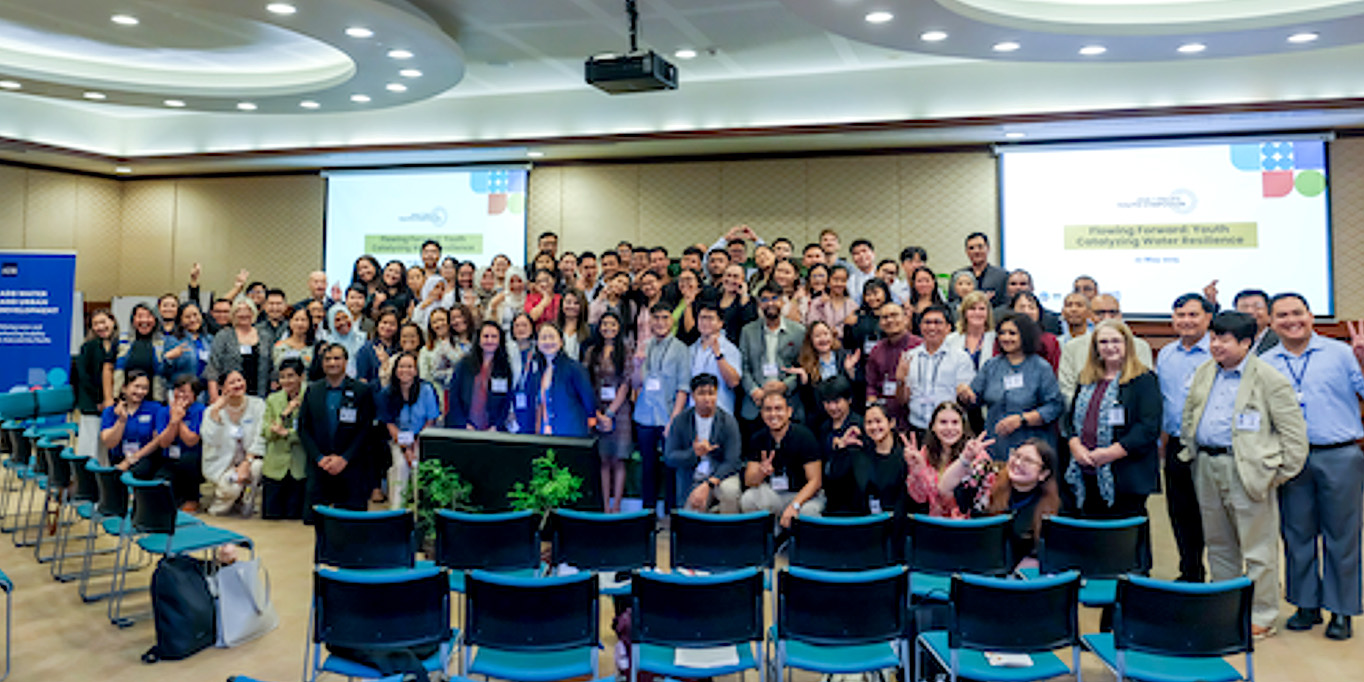Asia and the Pacific Youth Symposium/ADB Water and Urban Forum 2025 demonstrated how meaningful youth engagement can support innovation in large-scale sector events and partnership platforms, and marked a strategic step for ADB in positioning youth as partners in flagship sector dialogue and knowledge exchange. Held on 26–30 May 2025 at ADB Headquarters in Manila, the event carried the theme “Flowing Forward: Youth Catalyzing Water Resilience” and was co-convened by ADB, Plan International, and the International Water Association through the Philippine Young Water Professionals.
The event brought together 62 young water professionals and advocates from across Asia and the Pacific. Photo credit: ADB.
Young people were fully integrated throughout the water and urban forum, directly influencing technical dialogues with government delegations, civil society, international organizations, and the private sector. There were two key outcomes. First, five young authors held a co-creation session to develop youth-led insights for the Asian Water Development Outlook 2025, ADB’s flagship water security publication. Second, insights and priorities of young participants were included in the development of ADB’s Water and Youth Action Agenda, to guide meaningful youth engagement in ADB’s water sector operations. The Action Agenda builds on ADB’s long-term focus on the role of young people in catalyzing water solutions, supported under the Youth for Asia initiative.
The event applied the five pillars of meaningful youth engagement in the following ways:
The Philippine Young Water Professionals entered into a youth–adult partnership to co-convene the event. Young professionals led session design, facilitation, and reporting, while youth consultants acted as rapporteurs and communications leads. Directly embedded into both events’ core teams, youth consultants lead on a range of core priorities.
Planning for both events were aligned from the beginning. The water and urban forum’s main agenda included the youth symposium and highlighted youth events. Young professionals also served as speakers and moderators in plenary and technical sessions. Youth delegates had the opportunity to engage directly with government officials, technical experts, and development partners.
Other event features included
- innovative formats, such as the Reverse Sharktank: Youth Innovating in Water Solutions, that elevated youth from beneficiaries to technical contributors and policy influencers;
- co-creation workshops that allowed tangible youth inputs into ADB’s water operations, particularly on embedding youth engagement throughout the project lifecycle; and
- innovative use of physical space that strengthened youth engagement, such as the Youth Lounge, which held thematic sessions on climate, gender, and safeguarding, and functioned as convening space.
Targeted sessions on data storytelling, gender and inclusion in community resilience, and the multilateral financing system enabled effective youth participation. A Commitments Board translated learning into action. This catalyzed institutional responses where developing member country representatives echoed meaningful youth engagement principles, with several pledging to engage youth in national water planning.
ADB undertook good practices to create an enabling environment for meaningful participation of diverse groups. This included gender-balancing panels, fiscally supporting marginalized youth to attend, undertaking strong safeguarding, and providing sign language interpretation.
